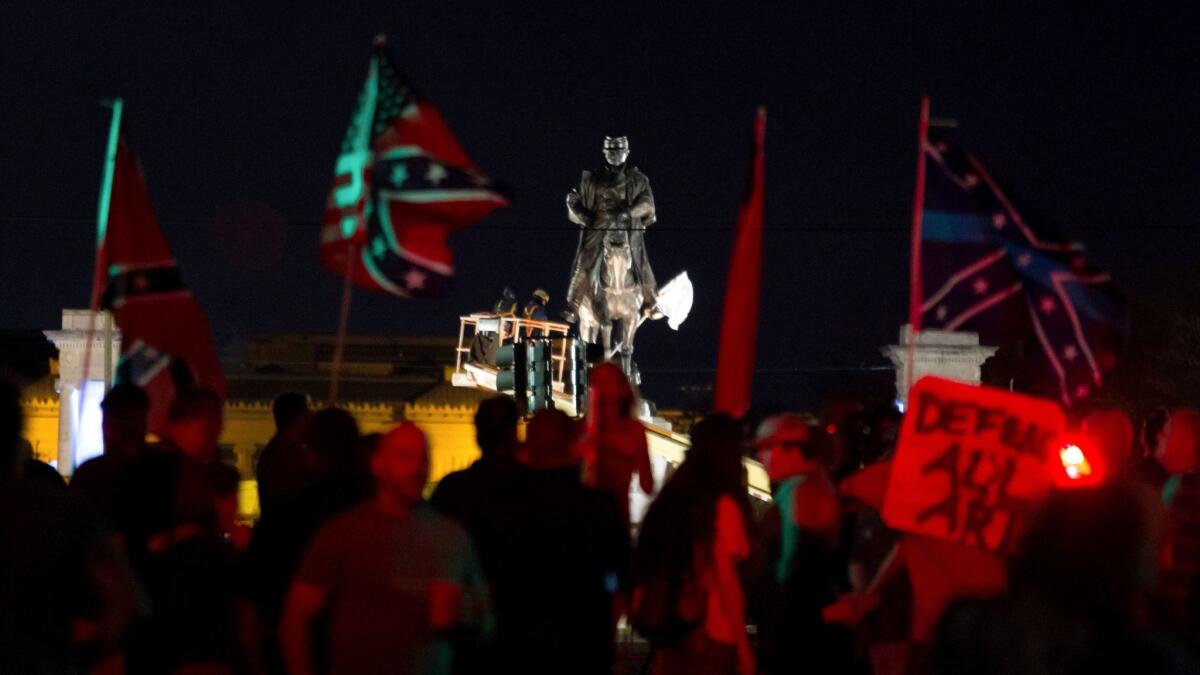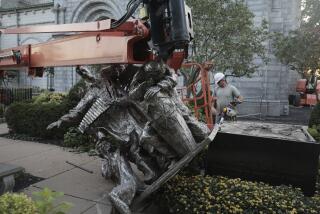New Orleans takes down third Confederate-era monument

- Share via
Reporting from New Orleans — Workers in New Orleans took down a Confederate monument to Gen. P.G.T. Beauregard early Wednesday, the third of four such monuments to come down in the city.
New outlets showed footage of the statue being lifted off its base shortly after 3 a.m.
The removal comes after the city has already taken down a statue of the Confederacy’s only president and a memorial to a white rebellion against a biracial Reconstruction-era government in the city.
“Today we take another step in defining our city not by our past but by our bright future,” New Orleans Mayor Mitch Landrieu said in a news release. “While we must honor our history, we will not allow the Confederacy to be put on a pedestal in the heart of New Orleans.”
Landrieu called for the monuments’ removal in the lingering emotional aftermath of the 2015 massacre of nine black parishioners at a South Carolina church. The killer, Dylann Roof, was an avowed racist who brandished Confederate battle flags in photos, recharging the debate over whether Confederate emblems represent racism or an honorable heritage.
The removal process has been anything but easy.
The City Council voted 6-1 in 2015 to remove the monuments after a succession of contentious public meetings where impassioned monument supporters and opponents heckled each other. Contractors involved in the removal process have been threatened, and the work stalled for months as monument supporters looked in vain to the courts for help. Workers removing the first two memorials generally wore bulletproof vests, helmets and face coverings to shield their identities, and the work took place well after midnight to minimize attention.
More recently, lawmakers in the Louisiana House backed a proposal aimed at keeping cities from removing Confederate monuments in a vote Monday that black lawmakers derided as “divisive” and “offensive.”
Workers at the Beauregard removal Tuesday night also covered their faces and wore helmets, but the atmosphere appeared slightly more low-key, with work starting in the evening after sunset. Local media showed images of monument supporters waving Confederate battle flags while those supporting their removal stood nearby, but reported the situation was largely peaceful. Across a bayou from the monument, some observers sat in lawn chairs to watch the proceedings, and a brass band celebrating the monument’s removal showed up after midnight, news outlets reported.
For supporters, the works are a way to remember and honor history.
“Mayor Landrieu’s actions are an insult to New Orleanians who came before us — the veterans, widows, parents, children, and citizens — who donated their personal money to build and place these monuments where they stand to honor the memory of their fallen family members,” said Pierre McGraw, president of the Monumental Task Committee, which has been advocating keeping the monuments in place.
But for many in this majority black city, the monuments pay honor to a history of slavery and segregation, and they want them down. When the statue of Confederate President Jefferson Davis was finally lifted from its pedestal, a cheer erupted from dozens of demonstrators who’d waited for hours to see the city fulfill its promise.
More to Read
Sign up for Essential California
The most important California stories and recommendations in your inbox every morning.
You may occasionally receive promotional content from the Los Angeles Times.













